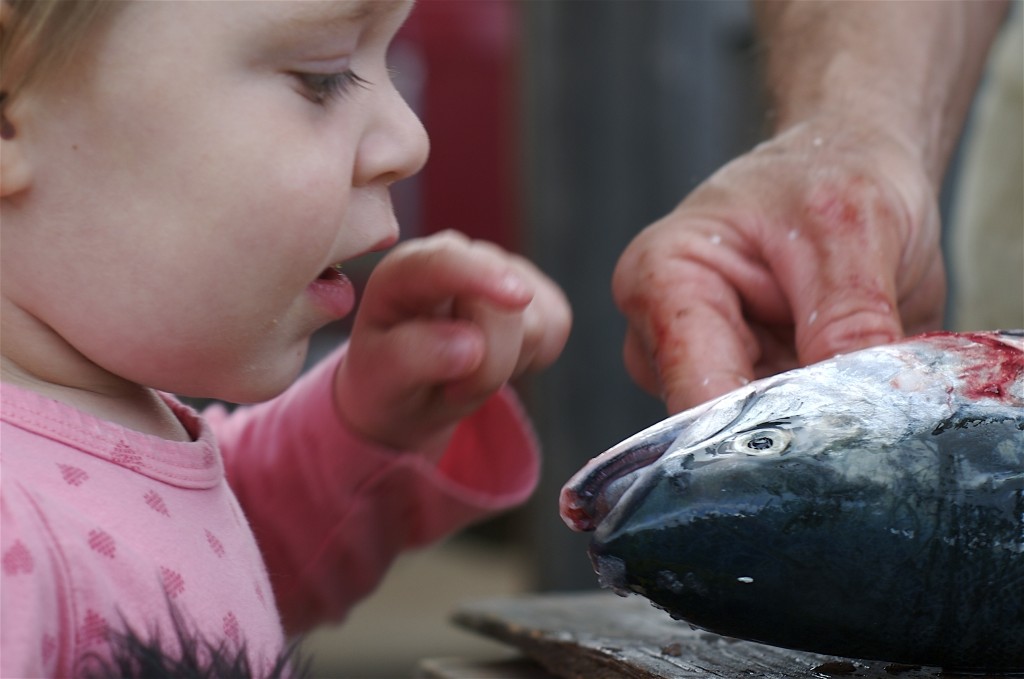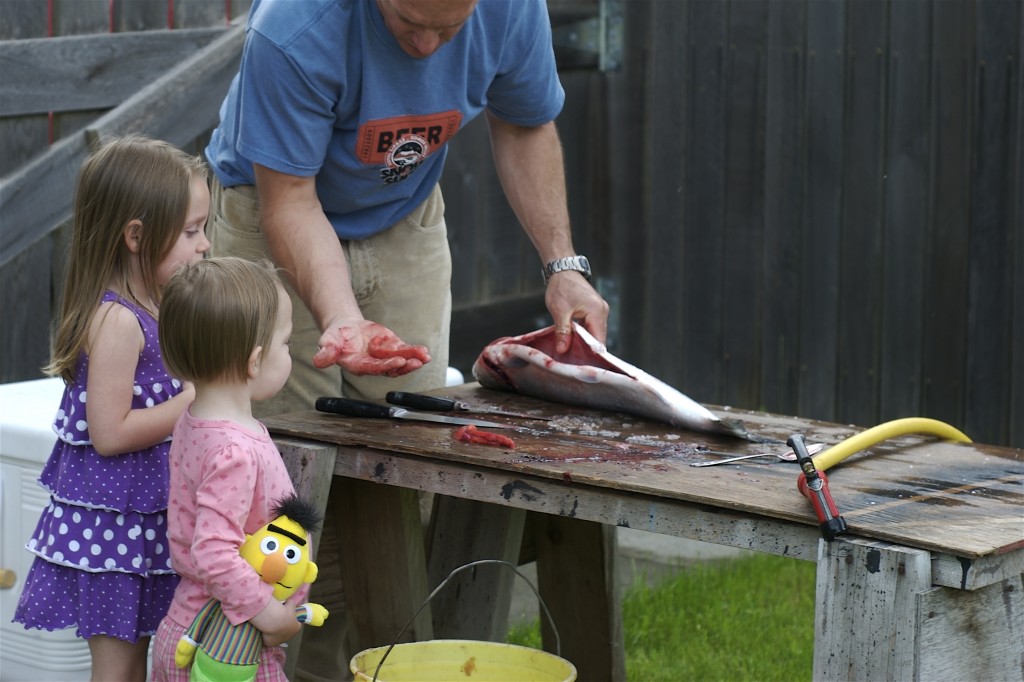“Did you ever stop to taste a carrot? Not just eat it, but taste it? You can’t taste the beauty and energy of the earth in a Twinkie.”
Astrid Alauda
We borrowed a fascinating ‘lift-the-flap’ book about sea creatures from the public library. One page illustrated how some predatory fish use light to attract their prey. A rather intimidating and toothy fish with a light atop his head was shown eating a smaller fish; this little guy had obviously been sucked in by the intriguing fish-head-lamp. Who could blame him? I’d certainly be curious. Under the flap were the words, “Bad luck, Fish!” Indeed.
Our family eats a lot of fish. I’m a pescatarian, which means I eat seafood, but no other type of meat. After a week of enjoying our ‘Sea Creatures’ book, my four-year-old daughter, Pip, started saying, “Bad luck, Fish!” whenever her fork dove into a piece of salmon at the dinner table.
One evening, Pip found herself with a piece of chicken on the end of her utensil. “Mama, is this chicken?”
“Yes, Pip.”
“But, did this used to be a real chicken running around and stuff, like at the petting zoo?”
“Yes, Sweetie, it used to be a real chicken running around.”
My husband, (who enjoys meat of all varieties,) and I have agreed to let our daughters choose whether or not they will eat meat. I don’t try to persuade the girls to be pescatarians, but I am honest with them about the source of their food.
Pip rolled her fork around in her hand and studied the white meat. I cold see that she was making some serious connections in her mind; Happy-Go-Lucky Chicken at the petting zoo one day, dead meat on her plate the next. Hmmmmmmm.,,
‘She won’t eat the chicken,’ I thought to myself, just before Pip announced,
“Bad luck, Chicken!” and, with a slight grin, she popped the morsel into her mouth.
Was this my sensitive little girl who showed such empathy with her friends? Was this the daughter who burst into tears when she saw a butterfly with an injured wing? Yes. This was she. (And her father was getting far too much enjoyment out of the ‘Bad luck’ line.)
It came as no surprise, therefore, when both of my daughters wanted to watch their dad clean salmon in the backyard. They were intrigued to say the least. I took my camera outside to capture the girls’ fascination with the deceased fish. They touched eyeballs and fins, and ran their little hands upon gleaming silver scales. As was expected, Pip uttered, “Bad luck, Fish!” more than once during the fish-cleaning extravaganza.


Before heading back inside to start the marinade, I offered a cautionary, “Don’t stand too close to Daddy when he’s cutting the fish!” to my daughters, (and my husband.) Was my advice heeded? Let me tell you, my poor heart skipped a beat when Pip and her dad appeared at the back door with Pip’s neck and dress completely covered in fish-blood. For an instant, I was reminded of that horrific scene in ‘Carrie’ when Sissy Spacek is standing onstage at her graduation, covered in pig’s blood. You know the one.
After I cleaned Pip, she and her sister joined me in the kitchen to finish preparing the rest of our dinner. I hoisted both girls onto the counter after we’d all washed our hands. First, the girls helped me finish the marinade, measuring the brown sugar and plopping it into our mixture of soy sauce and olive oil. They stirred it and splattered the marinade all over themselves and the counter. Next came the grated ginger. I did the grating and the girls picked up the flakes and put them into the bowl. After I’d poured the marinade onto the fish, it was time to prepare the rice and vegetables.
I pulled out the steamer and filled it with water. Pip and Fig assisted with every part of the dinner preparation, from rinsing the rice to placing the carrots into the steamer tray. Yes, it took a lot longer to prepare the meal than it would have if I was cooking by myself, and yes, the kitchen counter was a lot messier after my daughters had vacated it, but seeing the look of satisfaction in their eyes as we complimented them on the meal was worth the extra time and effort.
“Wow. Girls, this fish is delicious! Did you ever do a nice job of the marinade!” my husband gushed.
“We helped Mama with everything, Dad,” Pip explained with pride.
These are the formative years. Our children are developing attitudes toward things that they will carry through the rest of their lives. If we can give them a knowledge and respect for where their food comes from, and if we can provide them with positive experiences preparing nutritious food, serving it with pride and enjoying it with others, they will be empowered to make healthy food choices and create positive eating habits for the rest of their lives.
Most of the time, it’s FAR easier and faster to simply do things myself, but when I consider the opportunities for dialogue and experience that I can offer my kids when they ask, “Mama, can I help you?” it leads me to say,
“I’d love your help!”